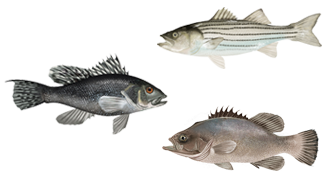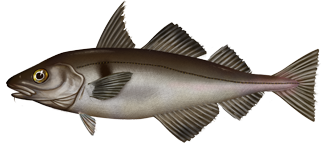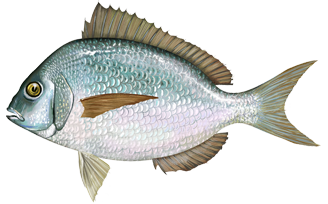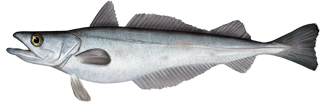Search for fish species near you
Use our map interface to search for species near you
LAUNCH THE MAP
Latest Research
The subject of the benefits and risks of eating seafood is a compelling and ongoing scientific issue. Around the world, researchers and health and medical professionals continue to conduct studies to expand what we know about this subject. Here is a round-up of some of the latest, peer-reviewed research on the subject:
Omega-3 may slow aging process, study finds
10.3.12
Hoping to extend your life? Eat more cold water fish such as tuna or salmon and consume less corn oil. According to new research out of Ohio State University, in the category of omega fatty acids, you're advised to take more omega-3 and less omega-6, those fatty acids derived from such foods as corn oil, sunflower oil and safflower oil. Omega-3 fatty acids, found naturally in certain fishes as well as in dietary supplements, may have a restorative effect on ever-shortening telomeres — those DNA sequences that are known to diminish as we age.
LEARN MORE... 
Omega-3 Benefits of Fish Outweigh Mercury Concerns
9.25.12
The hazards of eating mercury-laden seafood has made headlines over the past few weeks; however, a new study published in the American Journal of Clinical Nutrition suggests the heart-health benefits from omega-3 fatty acids outweigh the risks of mercury content at low levels.
LEARN MORE... 
Can fish protein cut the fat in fried food?
9.25.12
Researchers at Oregon State University have been working to reduce the fat content in fried seafood using fish protein found in surimi. They believe that the fish protein creates a protective layer around the food to reduce the fat uptake and retain the moisture, without altering the taste or texture of the product.
LEARN MORE... 
Fish Story: New Study Proves That the Frequent Consumption of White Fish Improves Blood Pressure, Lowers Cholesterol and Reduces Weight
6.5.12
While the health benefits of omega-3 fatty acids derived from fish has long been known, the first clinical study carried out on the health benefits derived from the hake fish specifically, was recently completed in Spain and is even more comprehensive in its conclusions on how fish -- particularly white fish -- directly impacts our health.
LEARN MORE... 
Fish tied to lower colon cancer risk: study
5.10.12
People who eat plenty of fish may have a lower risk of colon and rectal cancers, a new report published in the American Journal of Medicine suggests.
LEARN MORE... 
Omega-3s shown to help protect against harmful effects of smoking: scientists
4.23.12
While the best way to protect yourself from the harmful effects of smoking is to quit, researchers from Greece have found that omega-3 fatty acids can help repair arteries damaged by the unhealthy habit.
LEARN MORE... 
Early Omega-3 May Protect against Myocardial Infarction
3.2.12
Cardiologists from Sydney University and the University of California have found that omega-3 fatty acid supplements in the first five years of life may protect against myocardial infarction and stroke in later life.
LEARN MORE... 
A Diet Rich in Fish May Help the Aging Brain
2.28.12
New research suggests eating fish and other foods rich in omega-3 fatty acids could help people maintain healthy brains as they age, as well as protect their hearts.
LEARN MORE... 
EAting Fish Tied to Lower Risk of Colon Polyps
2.25.12
Women who eat about three servings of fish per week have a somewhat lower chance of having polyps found during a routine colonoscopy than women who eat just one serving every two weeks, according to a new study published in the American Journal of Clinical Nutrition.
LEARN MORE... 
Women Who Eat Fish During Pregnancy 'More Likely to Have Brainy and Sociable Children'
2.1.12
Women who eat fish during pregnancy are more likely to have brainy and sociable children, according to new EU-funded research. Those mothers-to-be who ate oily fish such as tuna, sardines, and salmon produced infants who scored better in various tests of skill and intelligence.
LEARN MORE... 
Lower Risk of Heart Failure in Women Who Eat Baked or Broiled Fish Often
1.7.11
A potentially effective approach to lowering the risk of heart failure might be to increase the consumption of fish or long-chain omega-3 polyunsaturated fatty acids (n-3 LC-PUFAs) found mainly in fatty fish. Several prospective observational studies have reported a lower risk of heart failure in individuals with high fish or n-3 LC-PUFA intakes.
LEARN MORE... 
Lower Risk of EArly Age-Related Macular Degeneration in Women Who Eat Fish Often
1.7.11
Like several chronic diseases, age-related macular degeneration (AMD) shares links with the amount of fish we consume. People who eat more fish are less likely to develop AMD than those who avoid fish.
LEARN MORE... 
Omega-3s May Cut Postpartum Depression Symptom Risk
1.7.11
Women would be wise to eat at least a serving of high-omega-3 fish 2 to 3 days per week to improve post partum mental health. Although fish oil supplements may be more acceptable to some women, the real thing is clearly the more nutritious option as a serving of fish is also protein- and mineral-rich. Clearly, fish as a "brain food" is gaining the nod from not only from the general public, but scientists as well.
LEARN MORE... 
Report of the Joint Expert Consultation on the Risks and Benefits of Fish Consumption
1.1.10
The World Health Organization and Food and Agriculture Organization of the United Nations found that healthy dietary patterns that include fish consumption and are established early in life influence dietary habits and health during adult life.
LEARN MORE... 












































